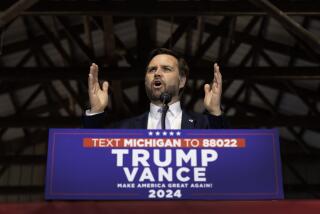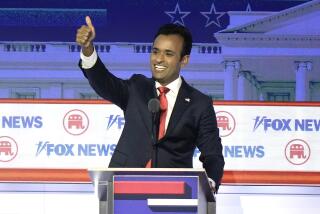After a Clumsy Debut, Quayle Has Eased Off Center Stage to Smooth Backup Role
- Share via
NEW YORK — Campaigning at a high school football practice in Mississippi the other day, Dan Quayle decided to quarterback a little scrimmage for the cameras.
On the first snap, Quayle uncorked a wobbly duck that fell a good five yards short of his intended receiver. Then, on the second play, he arced a long one just past the outstretched arms of a tight end. But on the third try, he connected.
“Wasn’t that first pass lousy?” he said later. “It almost embarrassed me. I haven’t thrown for a year or so but it’s just like the campaign. It’s getting better and better and better.”
At the very least, anyway, things are getting smoother and smoother and smoother on the campaign trail for the Republican vice presidential nominee after a wobbly start marred by charges that he pulled strings to get into law school and stay out of combat during the Vietnam War.
He still is greeted by an occasional sign that mocks his courage or, as was the case in South Carolina Sunday, a protester dressed in full chicken suit reminiscent of the one-time San Diego Padres mascot. And at a rally at the Statue of Liberty here Monday, a few dozen gay demonstrators tried to shout Quayle down with obscene gestures and raucous chants that questioned his commitment to fighting AIDS.
Weathers Storm
Still, the conservative Indiana senator seems to have weathered the storm, successfully easing himself off the main stage of the 1988 presidential campaign and into the sideshow traditionally reserved for the No. 2 man on the ticket.
Not that he has been lying low, but Quayle has set out on a carefully constructed campaign odyssey that, by and large, has taken him into friendly Republican territory that offers soothing backdrops of Americana for television--the football practice near Jackson, a day-care center in Little Rock, a retirement village in Laguna Niguel, a crafts fair in Georgia and, on Labor Day, a tour through historic Ellis Island in New York.
Strategists admit they are playing it safe for now, hoping to give Quayle some breathing room and themselves some time to map out the course of the campaign. Perhaps gun-shy after his stumbling campaign start, Quayle seems to have as hard a time loosening up as he has loosening his ever-present red tie, which remained firmly knotted even while he tossed footballs.
But as the veil of anonymity slips gradually from Quayle, a heretofore unknown figure on the national political circuit, a few themes have begun to emerge.
Most prominent is an aversion to liberal thought. His voice virtually sneers when he says the word.
In Quayle-speak, Democratic presidential nominee Michael S. Dukakis is “a defeatist liberal,” a dour pessimist who will threaten the Reagan Administration’s economic gains and invite communist aggression through vacillation and inexperience in foreign affairs.
“You in Alabama would never elect a liberal as your governor,” Quayle told farmers in Montgomery recently. “So why would you elect a liberal as your President?”
‘Can-Do Conservatives’
By contrast, Quayle refers to Vice President George Bush, the leader of the GOP ticket, and himself as “enlightened, can-do conservatives,” visionaries rooted in traditional family values and dedicated to building on the “Reagan revolution.” The most vivid sign of difference between the two presidential contenders, Quayle reminds his conservative audiences, is that “George Bush carries a membership card in the National Rifle Assn. and Michael Dukakis is a card-carrying member of the American Civil Liberties Union.”
Quayle vows repeatedly to stress a campaign of “ideology” and “issues,” with an emphasis on the three “F’s” of family, faith and freedom. Yet, both speeches and news conferences are long on political generalities and short on details of programs or promises save for defense matters, Quayle’s area of expertise in Congress.
“You know what he wants to do?” Quayle says often of Dukakis. “He wants to manage the decline of America. George Bush wants to manage the growth of America.”
The Quayle offense has drawn its bead squarely on Dukakis. Lloyd Bentsen, the Democratic vice presidential nominee, is largely ignored on the stump. “Bentsen’s not on the principal radar screen right now,” explained Ken Khachigian, a one-time White House wordsmith drafted to write speeches for Quayle.
By contrast, aides to Dukakis have announced that at least some of their advertising budget would be dedicated to attacks on Quayle, whom Democrats have criticized as a legislator of scant accomplishment.
“They’re going to spend thousands of dollars attacking the vice presidential candidate and that’s fine,” said Jim Cicconi, the issues director of the Quayle campaign. “It would hurt him if he couldn’t handle himself but he’s no dunderhead.”
Tendency to Oversimplify
A tendency to oversimplify has caused Quayle some problems, however. At a speech in Alabama and later at a news conference, he criticized American diplomats for impeding efforts to expand markets for U.S. goods overseas. But asked repeatedly to provide examples, he could not.
Similarly, in an attack on Dukakis for supporting gun control laws, Quayle said he saw no need for proposed federal legislation that would impose a uniform national waiting period before handgun purchasers could pick up their weapons. He quickly backtracked, however, when it was pointed out that even such a strong opponent of gun control as President Reagan has indicated he might go along with such an idea.
Conceding gaps in his knowledge of some areas of national interest, Quayle has declared himself a “quick study.” In an interview, however, he said he said he would like to concentrate, if elected, on areas in which he has worked in Congress--national security and education and job training. But Quayle said he and Bush had not yet discussed what role he would play in a Bush Administration.
Quayle traced his bedrock conservatism to values instilled in him as a boy by his grandfather, a wealthy and influential Indianapolis newspaper publisher. Still, he said, his 12 years in Congress--4 years in the House and 8 in the Senate--have made him “far more sensitive” to social problems.
“On the other hand,” he continued, “my ideas on national defense and national security and what provides deterrence have hardened. (Before entering Congress) I had a far more ambiguous viewpoint of the world than I do today. . . . (Now) I see the world in stark terms and real terms.”
Though a strong advocate of spending on new weapons programs, including the “Star Wars” spaced-based defense system, Quayle said the days of huge military spending increases were over.
More to Read
Get the L.A. Times Politics newsletter
Deeply reported insights into legislation, politics and policy from Sacramento, Washington and beyond. In your inbox twice per week.
You may occasionally receive promotional content from the Los Angeles Times.










